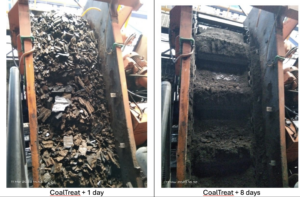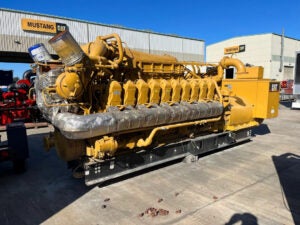Sentry Equipment, headquartered in Oconomowoc, Wisconsin, is a century-old, employee-owned manufacturer that specializes in industrial sampling equipment and solutions for process industries including power generation, water treatment, and oil and gas. It has earned global recognition for its expertise in providing accurate, representative sampling and analysis systems.
As a U.S. manufacturer that sources some materials from overseas and sells products globally, Sentry Equipment would seem particularly vulnerable to recent tariff policy changes. But that’s not what POWER found when we spoke with Rich Gaffney, the company’s vice president of Commercial Operations. His responses reveal a manufacturer experiencing minimal disruption—a perspective that may challenge common narratives about tariff impacts.

POWER: Have tariffs affected your ability to compete internationally or win bids against foreign manufacturers?
Gaffney: Not yet. What happens is our channel partners are bringing in some of our components, and they are doing the final integration testing in some cases.
POWER: Are you seeing tariffs create ripple effects beyond just material costs, such as longer lead times, reduced supplier options, or quality concerns?
Gaffney: One of the greatest challenges we’ve seen as it relates to tariffs has been in more lead time challenges, especially because everybody was rightsizing their inventory to get things shipped before the tariffs were implemented. We are lucky in that most of our supply chain is U.S.-based, but we do have subcomponents of some of our assemblies that could be coming from overseas.
POWER: Have you had to shift suppliers or sourcing strategies as a result of tariffs?
Gaffney: No. With any suppliers or equipment that we may have been impacted with longer lead times, we are unable to substitute out, so you just have to live with it. We haven’t had to make any wild pivots, and anything that we may feel a bit of a pinch on is not negotiable.
POWER: How have you approached pricing decisions with customers when tariff costs are unpredictable?
Gaffney: The one thing we have been doing as it relates to pricing is checking on older quotes, meaning, if a quote is outside of the expiration date, we are checking the pricing. We have not changed our expiration policy, and we haven’t had any wild swings, so it has not been a prolific issue yet.
POWER: Are customers willing to absorb cost increases or is there pressure to maintain pre-tariff pricing?
Gaffney: We haven’t seen much. With as much public attention that tariffs are getting, I don’t think anybody is surprised by the rising costs.
POWER: How has serving multiple markets helped buffer tariff impacts versus if you were in a single sector?
Gaffney: Because we have a diverse business strategy, we have good penetration across a lot of different markets. However, we also play in a niche spot in each market, so we haven’t seen one market completely drop
POWER: What operational changes have you made to stay agile?
Gaffney: We have not had to make any operational changes as a result of tariffs, but as a 100-year-old company, we are constantly looking at how to make our business more successful and sufficient, ultimately remaining agile to be prepared for the next 100 years. For example, we had a recent project where we brought manufacturing of specific components in house to get better control over inventory levels and overall quality. We’ve utilized 3D printing as a way to have continued growth in the manufacturing sector, and automation has also played a role. These are not tariff-related changes, but rather growth initiatives for Sentry to remain agile.
POWER: For sampling and monitoring equipment used in power generation, are you seeing utilities change their procurement patterns or delay projects due to cost uncertainty?
Gaffney: We haven’t really seen much change from the utility sector. The power generation market is in its renaissance period, driven in large part by the need for all these new data centers. You have companies more than Microsoft willing to invest into the power sector and potentially build their own modular units. Quite frankly, that is one of the sectors that is a little stronger at the moment.
POWER: Has there been any shift in demand between fossil fuel, nuclear, and renewable energy sectors that relates to tariff impacts?
Gaffney: The fossil fuel market has made a bit of a resurgence for us. That gets back to extending the life cycle of current infrastructure, current plants. The grid has been historically dominated by fossil fuel, so those plants are either getting extended permitting, or if they were going to be shut down, they’re not going to be shut down anymore, so they need to do major upgrades. The fossil fuel market has come back for us.
POWER: Are utilities and power plant operators asking for more domestic content or “Made in USA” documentation?
Gaffney: We haven’t seen a significant shift in policy. Some people already ask for such documentation, but we haven’t seen a significant shift yet. I suspect we are going to see some of that moving forward. As Sentry, we’re a proud U.S. manufacturer, so we’ve always made a point of letting them know that.
POWER: Do you view current tariff policies as a temporary disruption or a permanent shift requiring fundamental business model changes?
Gaffney: I think tariffs are going to stick around here, and I think it’s a fundamental shift in trade globally, but how specific or general the tariff laws are written in any country would be the trigger for us to change our business practices moving forward. Some of those sectors or segments, from Sentry’s perspective, we wouldn’t be dealing with. It would still be a non-issue for us, but it could be a bigger issue for consumers.
POWER: What would need to change policy-wise to improve conditions for manufacturers like Sentry Equipment?
Gaffney: It would nice if we could just get some more permanency to it, so we just understand what we’re dealing with. The volatility seems to be going down.
POWER: Despite the challenges, are there any unexpected opportunities tariffs have created?
Gaffney: Nothing stands out specifically from the tariffs. We already were a proud United States manufacturing company that tried to use as much U.S.-based goods as possible in products that we produce. Sentry has focused on that and continues to focus on that. If there is a shift to reshoring, there are going to be opportunities for some of our product lines, and we’ll be there and be ready to be a U.S.-based supplier.
—POWER










